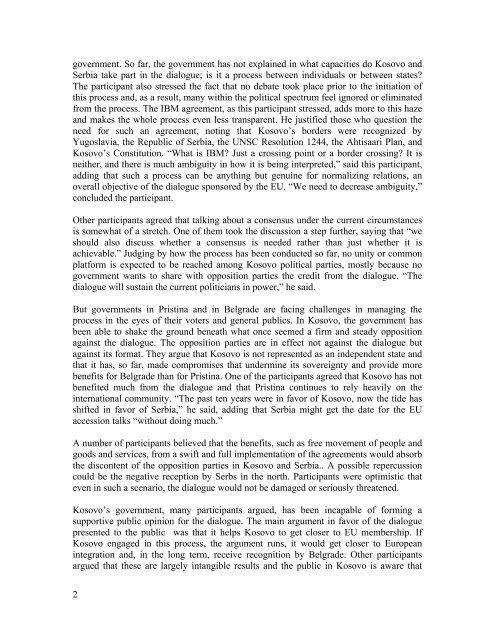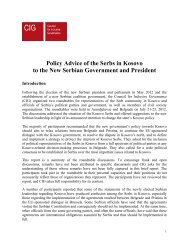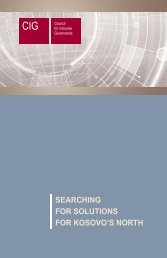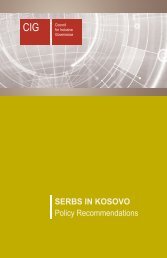Kosovo Albanian Interparty Consensus on Pristina-Belgrade Dialogue
Kosovo Albanian Interparty Consensus on Pristina-Belgrade Dialogue
Kosovo Albanian Interparty Consensus on Pristina-Belgrade Dialogue
Create successful ePaper yourself
Turn your PDF publications into a flip-book with our unique Google optimized e-Paper software.
government. So far, the government has not explained in what capacities do <str<strong>on</strong>g>Kosovo</str<strong>on</strong>g> and<br />
Serbia take part in the dialogue; is it a process between individuals or between states?<br />
The participant also stressed the fact that no debate took place prior to the initiati<strong>on</strong> of<br />
this process and, as a result, many within the political spectrum feel ignored or eliminated<br />
from the process. The IBM agreement, as this participant stressed, adds more to this haze<br />
and makes the whole process even less transparent. He justified those who questi<strong>on</strong> the<br />
need for such an agreement, noting that <str<strong>on</strong>g>Kosovo</str<strong>on</strong>g>’s borders were recognized by<br />
Yugoslavia, the Republic of Serbia, the UNSC Resoluti<strong>on</strong> 1244, the Ahtisaari Plan, and<br />
<str<strong>on</strong>g>Kosovo</str<strong>on</strong>g>’s C<strong>on</strong>stituti<strong>on</strong>. “What is IBM? Just a crossing point or a border crossing? It is<br />
neither, and there is much ambiguity in how it is being interpreted,” said this participant,<br />
adding that such a process can be anything but genuine for normalizing relati<strong>on</strong>s, an<br />
overall objective of the dialogue sp<strong>on</strong>sored by the EU. “We need to decrease ambiguity,”<br />
c<strong>on</strong>cluded the participant.<br />
Other participants agreed that talking about a c<strong>on</strong>sensus under the current circumstances<br />
is somewhat of a stretch. One of them took the discussi<strong>on</strong> a step further, saying that “we<br />
should also discuss whether a c<strong>on</strong>sensus is needed rather than just whether it is<br />
achievable.” Judging by how the process has been c<strong>on</strong>ducted so far, no unity or comm<strong>on</strong><br />
platform is expected to be reached am<strong>on</strong>g <str<strong>on</strong>g>Kosovo</str<strong>on</strong>g> political parties, mostly because no<br />
government wants to share with oppositi<strong>on</strong> parties the credit from the dialogue. “The<br />
dialogue will sustain the current politicians in power,” he said.<br />
But governments in <strong>Pristina</strong> and in <strong>Belgrade</strong> are facing challenges in managing the<br />
process in the eyes of their voters and general publics. In <str<strong>on</strong>g>Kosovo</str<strong>on</strong>g>, the government has<br />
been able to shake the ground beneath what <strong>on</strong>ce seemed a firm and steady oppositi<strong>on</strong><br />
against the dialogue. The oppositi<strong>on</strong> parties are in effect not against the dialogue but<br />
against its format. They argue that <str<strong>on</strong>g>Kosovo</str<strong>on</strong>g> is not represented as an independent state and<br />
that it has, so far, made compromises that undermine its sovereignty and provide more<br />
benefits for <strong>Belgrade</strong> than for <strong>Pristina</strong>. One of the participants agreed that <str<strong>on</strong>g>Kosovo</str<strong>on</strong>g> has not<br />
benefited much from the dialogue and that <strong>Pristina</strong> c<strong>on</strong>tinues to rely heavily <strong>on</strong> the<br />
internati<strong>on</strong>al community. “The past ten years were in favor of <str<strong>on</strong>g>Kosovo</str<strong>on</strong>g>, now the tide has<br />
shifted in favor of Serbia,” he said, adding that Serbia might get the date for the EU<br />
accessi<strong>on</strong> talks “without doing much.”<br />
A number of participants believed that the benefits, such as free movement of people and<br />
goods and services, from a swift and full implementati<strong>on</strong> of the agreements would absorb<br />
the disc<strong>on</strong>tent of the oppositi<strong>on</strong> parties in <str<strong>on</strong>g>Kosovo</str<strong>on</strong>g> and Serbia.. A possible repercussi<strong>on</strong><br />
could be the negative recepti<strong>on</strong> by Serbs in the north. Participants were optimistic that<br />
even in such a scenario, the dialogue would not be damaged or seriously threatened.<br />
<str<strong>on</strong>g>Kosovo</str<strong>on</strong>g>’s government, many participants argued, has been incapable of forming a<br />
supportive public opini<strong>on</strong> for the dialogue. The main argument in favor of the dialogue<br />
presented to the public was that it helps <str<strong>on</strong>g>Kosovo</str<strong>on</strong>g> to get closer to EU membership. If<br />
<str<strong>on</strong>g>Kosovo</str<strong>on</strong>g> engaged in this process, the argument runs, it would get closer to European<br />
integrati<strong>on</strong> and, in the l<strong>on</strong>g term, receive recogniti<strong>on</strong> by <strong>Belgrade</strong>. Other participants<br />
argued that these are largely intangible results and the public in <str<strong>on</strong>g>Kosovo</str<strong>on</strong>g> is aware that<br />
2





